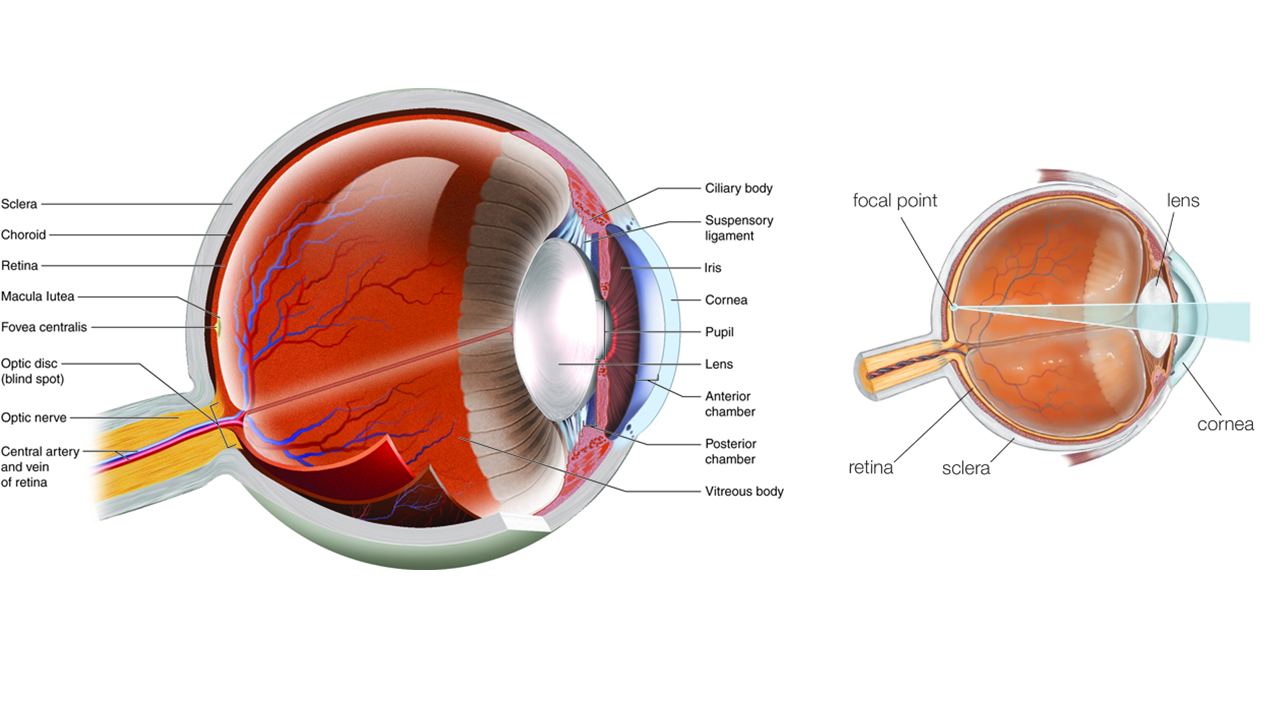Myopia, commonly known as nearsightedness, is a ocular condition where a person can see nearby objects clearly, but distant objects appear hazy. Myopia affects millions of people worldwide, and is often considered a disability. But, if it is truly a disability then why each successive generation is becoming increasingly more myopic? Can there be “hidden” advantages presented to us via myopia?
Before we explore this interesting line of thought, we first need to understand the anatomy and physiology of our eyes.

Here are the key players:
- The Cornea: This is the transparent outermost layer of the eye through which light enters our eyes. Cornea helps focus incoming light.
- The Iris: This lies behind cornea and serves as an aperture. Not all light entering cornea is allowed inside. Depending on how much amount of light is needed, this aperture- maintained by iris- either widens or shrinks.
- The Lens: Located behind the iris, the lens focusses the incoming light onto the retina.
- The Retina: This light-sensitive screen lines the back of the eye. This biological screen contains specialized cells called rods and cones, which capture and process light into electrochemical signals.
- The Optic Nerve: Acting as a cable, the optic nerve carries the electrochemical signals generated by retina to the brain for interpretation. The signals from retina get converted back into images in the brain.
If the eyeball is too long or the cornea is too curved, light will incorrectly focus in front of the retina instead of on it. This results in blurry distance vision, medically known as myopia. Myopia can be corrected with concave glasses, contact lenses, or refractive surgery, but it cannot be cured.

So, myopia is defective vision. But why ~50% population in industrialized countries suffer from this? Epidemiological studies show that younger generations are getting impacted with myopia more frequently than older ones. Both prevalence and incidence of myopia is incrementally increasing in every population around the world. Is it a curse of modern life?
Or is myopia an evolutionary gift?
It is widely believed that myopia is more common in people who do a lot of close-up work, such as reading, writing, and using computers. If you observe human beings closely, almost always we are relying in accuracy of near vision. We don’t have to climb trees and look out for predators. But we definitely have to read books and work on computer screens. Thus nearsightedness is more often in use for us.
Evolution enhances what is important and sheds off what is not.
So, if distant vision is not offering significant survival benefits it is bound to become weaker and weaker as human evolve. Having myopia or nearsightedness may have had an advantage in tasks that required close-up vision. Our survival and success depends on how well we assess facial expressions of people we are interacting with. Negotiating successfully with people around us is a key leadership skill. Someone who has mastered this skill heavily relies on keenly observing all the physical signals generated by faces and hands of people he/she is conversing with. In today’s information age, our capabilities are judged based on how good we are with the information we retain from whatever we read or how we use computers.
There are now scientific evidences suggesting that myopia may have played a role in the evolution of human intelligence. According to this theory, our ancestors who were , such as making tools and identifying edible plants. This may have led to the development of higher cognitive abilities, such as problem-solving and abstract thinking. Research suggests that myopia may confer cognitive advantages. The constant need to focus on nearby objects can enhance attention to detail and object recognition skills.
So, if you’re the one who spots the smallest details in a painting or quickly finds hidden items in a cluttered room, your myopic vision might be the secret behind it.
To conclude, myopia seems to be an outcome of our evolution. Myopia might associated with higher intelligence and social capabilities, thus providing survival advantage in this modern world. If you find this interesting, please do read my articles on how human evolution and survival advantage lies in connecting people and making meaningful organizations. Please click HERE to read.
References:
- Foster, P. J., & Jiang, Y. H. (2014, January 10). Epidemiology of myopia. Eye; Nature Portfolio. https://doi.org/10.1038/eye.2013.280
- Cooper, J., & Tkatchenko, A. V. (2018, July 1). A Review of Current Concepts of the Etiology and Treatment of Myopia. Eye & Contact Lens-science and Clinical Practice; Lippincott Williams & Wilkins. https://doi.org/10.1097/icl.0000000000000499
- Verma, A., & Verma, A. (2015, January 1). A Novel Review of the Evidence Linking Myopia and High Intelligence. Journal of Ophthalmology; Hindawi Publishing Corporation. https://doi.org/10.1155/2015/271746






There are some fascinating points in time on this article but I don’t know if I see all of them heart to heart. There is some validity but I will take maintain opinion till I look into it further. Good article , thanks and we would like more! Added to FeedBurner as properly
What i do not understood is in truth how you are not actually a lot more smartlyliked than you may be now You are very intelligent You realize therefore significantly in the case of this topic produced me individually imagine it from numerous numerous angles Its like men and women dont seem to be fascinated until it is one thing to do with Woman gaga Your own stuffs nice All the time care for it up
Hey there, You have done a fantastic job. I will certainly digg it and personally recommend to my friends. I’m confident they’ll be benefited from this site.
Wow superb blog layout How long have you been blogging for you make blogging look easy The overall look of your site is magnificent as well as the content
I just could not depart your web site prior to suggesting that I really loved the usual info an individual supply in your visitors Is gonna be back regularly to check up on new posts
Fantastic site Lots of helpful information here I am sending it to some friends ans additionally sharing in delicious And of course thanks for your effort